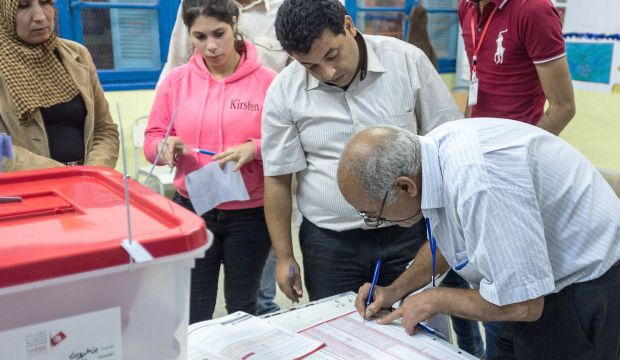
Tunisian election officials work during the count process at a polling station during the country’s first post-revolution parliamentary election in Tunis, on October 26, 2014. (AP PHOTO/Aimen Zine)
Election authorities are expected to announce official results later in the day, but if confirmed the result would be a setback for Ennahda, which led a government after winning the most seats in 2011 in the first free election after the fall of Zine El-Abidine Ben Ali.
Tunisians voted for their new parliament on Sunday in a ballot that brings full democracy within their reach almost four years after an uprising that cast out autocrat Ben Ali and inspired the “Arab Spring” revolts.
Moderate Islamist party Ennahda and rival secular alliance Nidaa Tounes had been favored to win most seats in only the second free election in Tunisia since Ben Ali fled into exile in Saudi Arabia after protests against corruption and repression.
With no party expected to win outright, some coalition is likely during weeks of deal-making to form a new government. Presidential elections next month may also delay the immediate formation of a new government.
Ennahda party officials on Sunday urged supporters to wait for the official results, while Nidaa Tounes leader Beji Caid El-Sebsi had said “indications” showed his party had taken in the lead in the poll.
Electoral authorities were due to give preliminary results later on Monday, but larger parties had observers at each polling station to oversee the initial counting.
Since its revolt, Tunisia has fared better than its neighbors which also ousted long-ruling leaders during 2011, avoiding the turmoil suffered by Egypt and the outright civil war of Syria and chaos of Libya.
While the role of Islam in politics overshadowed the first election in 2011, jobs, economic opportunities and Tunisia’s low-intensity conflict with Islamist militants were the main concerns of a country heavily reliant on foreign tourism.
Critics had blamed Ennahda’s government with two smaller secular partners for mismanaging the economy, for inexperience and for laxity with hard-line Islamists. Its government was forced to step down after a crisis over the murder of two opposition leaders last year.
After overcoming the deadlock that threatened to sink its new democracy, Tunisia approved a new constitution at the start of the year and won praise as a model for a region struggling with chaos and violence.

Trackbacks/Pingbacks